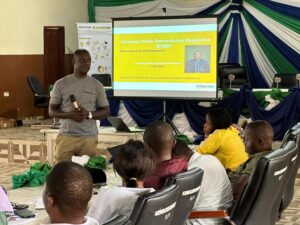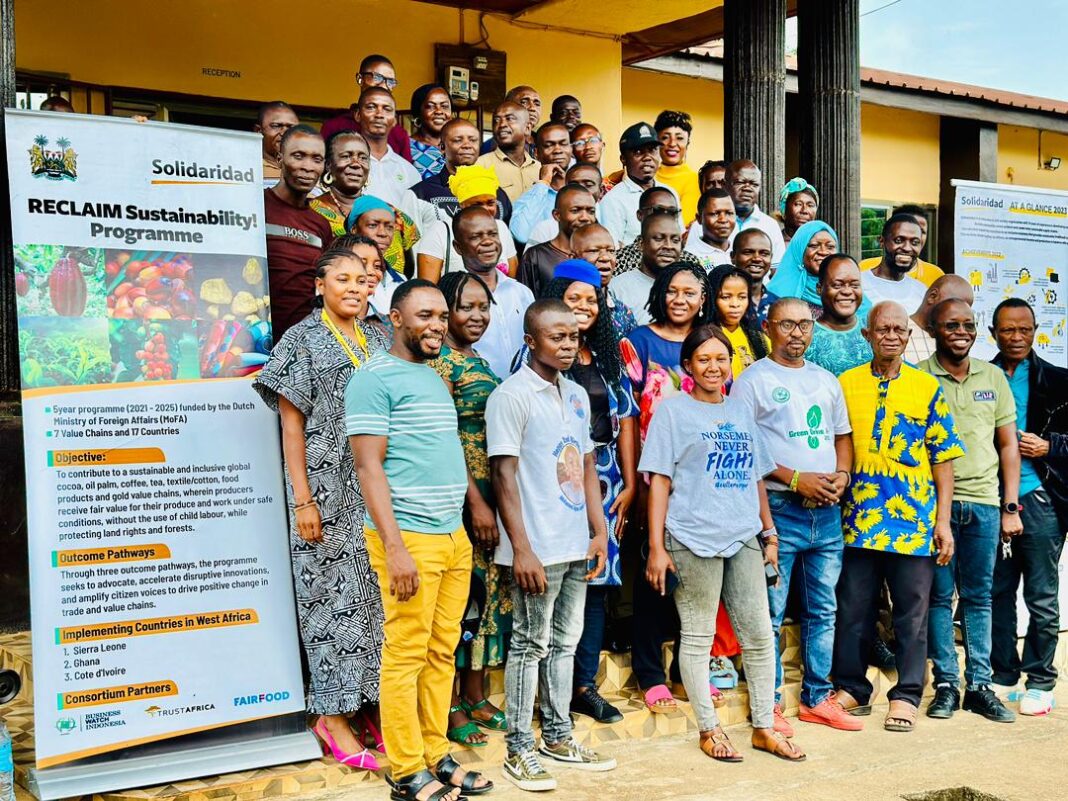By Angelica Adama Mansaray
Solidaridad West Africa in Sierra Leone, in collaboration with the Ministry of Agriculture and Food Security and the Produce Monitoring Board in Sierra Leone, has completed a one-day sensitisation workshop to raise awareness among farmers and stakeholders about the European Union Deforestation Regulation (EUDR).
In his opening address, Andrew Kojo Morrison, Country Representative of Solidaridad West Africa in Sierra Leone, said that the workshop aimed to educate key stakeholders—including farmers, civil society organisations (CSOs), media practitioners, government officials, and representatives from cocoa and oil palm companies—about the EUDR. Participants came from Kenema, Kailahun, and Bo.
This initiative aims to ensure that agricultural products from Sierra Leone meet EUDR standards.
Morrison mentioned that the awareness and education session on the European Union Deforestation Regulation, set to come into force in December 2024, is crucial.
‘With six months to go Solidaridad and its partners, through the RECLAIM Sustainability! Programme, have embarked on intensive awareness campaigns around the country.’
The country representative said the process has begun, starting with meetings with the Sierra Leone Cocoa Coffee Cashew Platform and other stakeholders, including cocoa stakeholders and companies.

Morrison emphasised that the aim is to ensure that all companies responsible for meeting these requirements are aware of them and are taking steps to comply.
Therefore, he added, Solidaridad will continue to engage with various companies to see where it can provide support in meeting these requirements.
Solidaridad is also working with District Councils, the Ministry of Agriculture and Food Security, and the Produce Monitoring Board to ensure they are part of the process in helping companies meet the EUDR requirements.
The workshop, which targeted farmers and stakeholders in the eastern part of the country, was part of the RECLAIM Sustainability! Programme funded by the Dutch Ministry of Foreign Affairs. This programme seeks to amplify the voices and rights of farmers, workers, and citizens.
Tamba Theophilus Karimu, District Agriculture Officer at the Ministry of Agriculture and Food Security in Kailahun District, said that the EU regulation is very restrictive, especially for those encroaching on forest reserves for food plantations and other products intended for the EU market.
‘The EU has made it clear that if you encroach on forest reserves, the government will prohibit such activities. If you cut down these forest reserves for cultivation, the EU will not buy any products grown there,’ he said.
Karimu emphasised that this regulation is beneficial because it helps governments control forest reserves, preventing encroachment by farmers.
Over the years, farmers have been encroaching to establish plantations, he said, adding that the EU’s regulation is a positive step as it restricts farmers from entering and clearing forest reserves.
‘If you plant your crops there, you won’t be able to sell them in the EU market. This is advantageous for us because forest reserves regulate the climate, rainfall, and sunshine. Cutting them down would lead to irregular rains, affecting our agricultural production,’ Karimu said.
He further explained that the Ministry of Agriculture and Food Security wants farmers to produce on a large scale, especially rice, to ensure the country is self-sufficient.
‘If people continue to cut down forests, irregular rains will impact rice production. Maintaining our forest reserves ensures regular rainfall, supporting agricultural production and enabling us to feed our nation.’
Karimu concluded that the EU regulation will help control encroachment on forest reserves in Sierra Leone. ‘We are very happy with this agreement. It raises awareness among our farmers, deterring them from encroaching on forest reserves. Keeping our forest reserves intact will help control climate change.’
Charles Campbell, District Coordinator of the Produce Monitoring Board, thanked Solidaridad for raising awareness on the EUDR, especially among farmers across the country who are not aware of the implications of deforestation.
‘It will be difficult for farmers to adapt to the EUDR, but as a regulatory body, we will work with Solidaridad to ensure that they understand and adhere to the European Union Deforestation Regulations,’ he said.
He went on that this will also help protect soil and crops from erosion and safeguard our environment from the effects of global warming. During the one-day event, held on 4 July, 2024, at the Kenema District Council, Solidaridad and the Ministry of Agriculture also provided capacity training for women to take part in decision-making processes. This initiative aims to empower women to take on leadership roles and responsibilities and to be involved in the policy making process, thereby strengthening their skills and capacities in the cocoa and oil palm value chains in the country.


